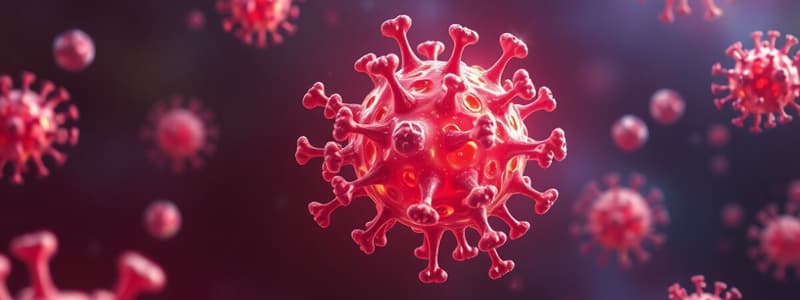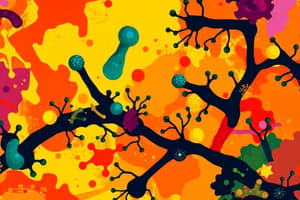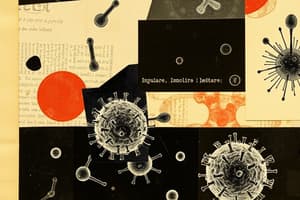Podcast
Questions and Answers
What is the primary role of antibodies in the immune response?
What is the primary role of antibodies in the immune response?
- Facilitating the clonal deletion of T cells
- Directly attacking pathogens
- Producing antigens
- Neutralizing pathogens and aiding their removal (correct)
Which immunoglobulin class is primarily responsible for the first response to bacterial infections?
Which immunoglobulin class is primarily responsible for the first response to bacterial infections?
- IgA
- IgD
- IgE
- IgM (correct)
How do haptens differ from traditional antigens?
How do haptens differ from traditional antigens?
- Haptens are proteins only.
- Haptens are not immunogenic unless bound to a larger molecule. (correct)
- Haptens can stimulate T cells directly.
- Haptens are usually larger than antigens.
What is the function of plasma cells in the immune system?
What is the function of plasma cells in the immune system?
Which statement best describes the difference between primary and secondary immune responses?
Which statement best describes the difference between primary and secondary immune responses?
What is an epitope?
What is an epitope?
In which part of the body do B lymphocytes mature?
In which part of the body do B lymphocytes mature?
Which type of T cell is directly involved in killing infected or cancerous cells?
Which type of T cell is directly involved in killing infected or cancerous cells?
Which immunoglobulin class has a role in mucosal immunity and is found in secretions such as saliva and breast milk?
Which immunoglobulin class has a role in mucosal immunity and is found in secretions such as saliva and breast milk?
What is the primary mechanism of action for antibodies involved in opsonization?
What is the primary mechanism of action for antibodies involved in opsonization?
Which statement correctly describes the primary response compared to the secondary immune response?
Which statement correctly describes the primary response compared to the secondary immune response?
What is the main characteristic of haptens that differentiates them from larger antigens?
What is the main characteristic of haptens that differentiates them from larger antigens?
In which part of the body do T lymphocytes undergo maturation?
In which part of the body do T lymphocytes undergo maturation?
Which feature is characteristic of both B cells and T cells during an immune response?
Which feature is characteristic of both B cells and T cells during an immune response?
What is the role of major histocompatibility complex (MHC) molecules in the immune system?
What is the role of major histocompatibility complex (MHC) molecules in the immune system?
What distinguishes IgM from other immunoglobulin classes?
What distinguishes IgM from other immunoglobulin classes?
Flashcards
Antigen
Antigen
A substance that triggers an immune response.
Protein vs. Polysaccharide Antigens
Protein vs. Polysaccharide Antigens
Proteins are stronger immune triggers, while polysaccharides are weaker.
Epitope
Epitope
A specific region of an antigen that is recognized by an antibody.
Hapten
Hapten
Signup and view all the flashcards
Immunoglobulin (Antibody)
Immunoglobulin (Antibody)
Signup and view all the flashcards
Antigen-Antibody Reactions (ex: Neutralization)
Antigen-Antibody Reactions (ex: Neutralization)
Signup and view all the flashcards
B-lymphocyte Maturation
B-lymphocyte Maturation
Signup and view all the flashcards
Clonal Selection
Clonal Selection
Signup and view all the flashcards
What makes a substance an antigen?
What makes a substance an antigen?
Signup and view all the flashcards
What is an epitope?
What is an epitope?
Signup and view all the flashcards
How do antibodies neutralize pathogens?
How do antibodies neutralize pathogens?
Signup and view all the flashcards
Where do B cells mature?
Where do B cells mature?
Signup and view all the flashcards
What are B cell/T cell clones?
What are B cell/T cell clones?
Signup and view all the flashcards
Study Notes
Antigen Characteristics
- Antigens are substances that trigger an immune response.
- Proteins are stronger antigens than polysaccharides.
- Must be large (molecular weight > 10,000), non-self, and degradable.
- Antigens have specific reactive sites called epitopes.
- Antibodies (immunoglobulins) have complementary reactive sites called paratopes.
- Small molecules (haptens) become immunogenic when combined with body proteins.
Immunoglobulins (Antibodies)
- Immunoglobulins are globular proteins.
- They have specific reactions with antigens:
- Neutralization of pathogens
- Opsonization for phagocytosis
- Agglutination
- Complement activation
- Antibody-dependent cell-mediated cytotoxicity
Lymphocyte Maturation
- B lymphocytes mature in the bone marrow.
- T lymphocytes mature in the thymus.
Antibody Classes (Immunoglobulins)
- IgG: Most abundant (80%), crosses placenta, antitoxin, divalent.
- IgM: Pentamer, first made, highly antibacterial, decavalent.
- IgA: Secretory, found in fluids (mucus, saliva, tears, breast milk), 10-15%
- IgD: 0.5%
- IgE: 0.002%, binds to mast cells/basophils, triggers allergic reactions.
- Each class has a different function and half-life.
B Cell Function
- Plasma cells are antibody-producing factories.
- B memory cells provide long-term immunity.
- Clonal selection determines which B cells respond to a specific antigen.
- Clonal deletion removes potentially harmful B cell clones.
T Cell Function
- Helper T cells assist B cells in response to antigens.
- Cytotoxic T cells (Tc) kill infected or cancerous cells using perforins and granzymes.
- Natural killer T (NK) cells directly attack non-self cells.
- Thymus is the maturation site
Immune Responses
- Primary response: takes 7-10 days to produce protective antibodies, IgM first then IgG.
- Secondary (memory) response: quicker and stronger (1-2 days), higher antibody production.
- Booster shots (vaccinations) stimulate a secondary response.
Antigen-Antibody Reactions
- Agglutination: clumping of antigens.
- Opsonization: coating of antigens to enhance phagocytosis.
- Neutralization: blocking of harmful effects of antigens.
- Complement activation: cascade of proteins to enhance immune response.
- Antibody-dependent cell-mediated cytotoxicity: antibodies mark cells for destruction.
Studying That Suits You
Use AI to generate personalized quizzes and flashcards to suit your learning preferences.



